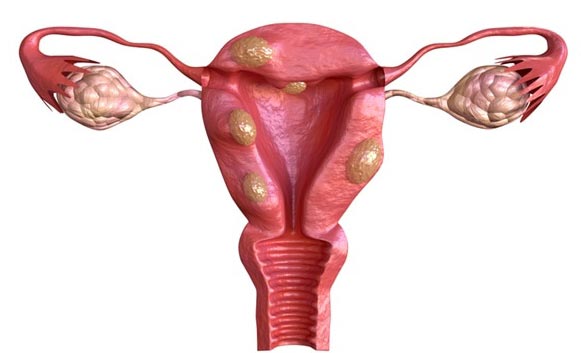What are uterine fibroids?
Uterine fibroids are noncancerous (benign) tumours that develop on the uterine muscular tissue. In most cases, women have multiple fibroids that vary in location and size. These can change the shape and size of your uterus as well as have an effect on your cervix. You may develop symptoms or experienced infertility as a result of their size and location, necessitating treatment. For uterine fibroid treatment book, your appointment with Dr. Deepika is one of the best doctor for fibroid in Borivali.
There are three main types of fibroids, which differ depending on where they are found:
- Subserosal fibroids on your outer uterine wall (55%)
- Intramural fibroids are fibroids found within the layers of the uterine wall (40 percent )
- Submucosal fibroids protruding into the uterine cavity (5 percent )

Can fibroids lead to infertility?
Fibroids larger than 6cm in diameter and located inside your uterine cavity can complicate your ability to become pregnant. Only submucosal fibroids usually protrude into the uterus, affecting fertility. Large fibroids that obstruct the fallopian tubes into your uterus are an exception.
The majority of women with fibroids do not experience infertility. If problems arise, the couple must look for any other factors that may be causing the problem before deciding on fibroid treatment. The doctor can determine whether fibroids are interfering with your fertility and whether you need treatment.
How can fibroids cause infertility?
- Uterine fibroids can affect fertility in a variety of ways depending on their location and size, as well as how they affect the condition of your fallopian tubes, cervix, or uterus. Examples include:
- Fibroids block the fallopian tubes, making implantation of a fertilised egg difficult or impossible.
- Changes in the shape of your cervix that may affect the number of sperms that enter your uterus.
- Changes in the shape of the uterus that can interfere with the movement of the embryo or sperm.
- Fibroids are affecting the thickness of the uterine lining.
- The blood flow to your uterus is being affected. This can reduce the embryo’s ability to implant or develop in your uterine wall.
Symptoms of Uterine Fibroids
The majority of women have no symptoms of uterine fibroids. In other cases, symptoms vary according to the size, location, and number of fibroids and can include any of the following.
- Periods that can last up to a week
- Heavy bleeding
- Frequent urination
- Pelvic discomfort or pressure
- Backache or leg pain
- Problems with bladder emptying
- Constipation
Uterine Fibroids: How Are They Treated?
Gonadotropin-releasing hormone agonists: Also known as Gn-RH agonists, these medications can induce menopause in order to block the effects of estrogen and progesterone. Once your body is in this state, the fibroids will shrink.
Progestin-releasing intrauterine device (IUD): This device, also known as an IUD, is an effective treatment for women who have heavy menstrual bleeding caused by fibroids. This, however, only helps with the bleeding. It will not reduce the size of your fibroids. Furthermore, it prevents pregnancy.
Non-invasive procedure: An MRI-guided procedure that is performed while you are inside the MRI machine. The MRI machine aids doctors in identifying the location of tumours. They then break them down using sound waves.
Uterine artery embolization: This procedure stops blood flow to the fibroids. As a result, they shrink.
Myolysis: Experts use an electric current to destroy the fibroids in this procedure. Conversely, they may use a laser instead.
Endometrial ablation is a treatment that involves the use of heat, hot water, microwave energy, and currents. It destroys the uterine lining, preventing fibroids from growing.Hysteroscopy and Myomectomy: Thisl treatment is used if you have fibroids growing inside the uterus.
What is the cost of Fibroid operation in Mumbai ?
Depending upon the surgery done fibroid operation may cost between 30,000 and 1.5 lakhs. Laparoscopic procedures are generally more costly than open surgery.
Dr. Deepika Doshi is a Gynecologist, Obstetrician, and Laparoscopic Surgeon (Obs & Gyn), and Fibroid doctor in Borivali West. For consultation call 9324263464
MOST SEARCHED KEYWORD
Gynecologist in Krishna Nagar, Shanta Nagar, Borivali West | Gynecologist in Ekta Bhoomi Garden 3, Food Corporation of India Warehouse | Gynecologist in Khanderao Dongari, Borivali East | Gynecologist in Mig Colony, Borivali | Gynecologist in Sumer Nagar, Borivali West | Gynecologist in Hari Om Nagar, Borivali West | Gynecologist in Vivekanand Nagar, Borivali West | Gynecologist in Roshan Nagar, Borivali West | Gynecologist in Himmat Nagar, Borivali West | Gynecologist in Pai Nagar, Borivali West | Gynecologist in Ambawadi, Borivali | Gynecologist in Nehru Nagar, Daulat Nagar, Borivali | Gynecologist in Sukarwadi Borivali | Gynecologist in Chitrakoot, Kulupwadi Borivali | Gynecologist in IC Colony, Borivali West | Gynecologist in LIC Colony, Borivali West | Gynecologist in Gorai, Borivali West | Gynecologist in Eksar, Borivali West | Gynecologist in Maharastra Nagar, Borivali West | Gynecologist in Saibaba Nagar, Borivali West | Gynecologist in Yogi Nagar, Borivali West



